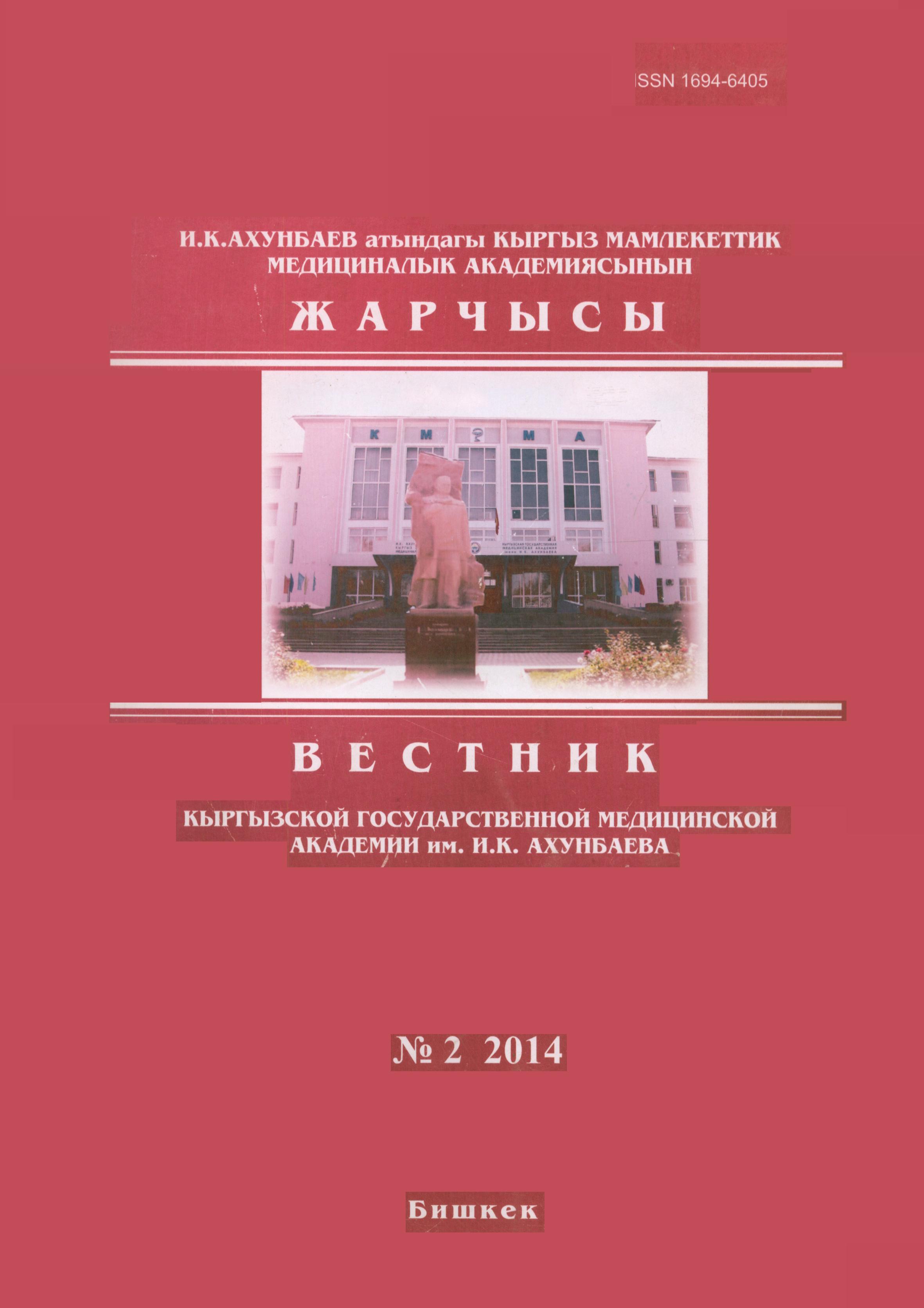АССОЦИАЦИЯ Т455С ПОЛИМОРФИЗМА ГЕНА АПОЛИПОПРОТЕИНА С-3 С ИНСУЛИНОРЕЗИСТЕНТНОСТЬЮ И АБДОМИНАЛЬНЫМ ОЖИРЕНИЕМ
Аннотация
Изучена ассоциация Т455С полиморфизма гена аполипопротеина С-III (апоС3) с инсулинорезистентностью (ИР) и компонентами метаболического синдрома (МС) в кыргызской этнической группе.
Ключевые слова:
Т455С полиморфизм; аполипопротеин С-III; инсулинорезистентность; абдоминальное ожирениеБиблиографические ссылки
1. Grundy S.M., Cleeman J.I., Daniels S.R. et al. Diagnosis and management of the metabolic syndrome: an American Heart Association/National Heart, Lung and Blood Institute scientific statement. Curr Opin Cardiol 2006; 21: 1-6
2. Mamedov MN, Oganov RG. Is it necessary to detect insulin resistance for diagnosis of metabolic syndrome in clinical practice? Kardiologiia. 2005;45(4):92-97.
3. Muniyappa R., Sowers JR. Role of insulin resistance in endothelial dysfunction. Rev Endocr Metab Disord 2013; 14(1): 5-12
4. Bosy-Westphal A, Onur S., Geisler C. et al. Common familial influences of metabolic syndrome traits with central obesity and insulin resistance: the Kiel obesity prevention study. Int J Obes (Lond) 2007; 31: 784-790
5. Henneman P, Aulchenko YS, Frants RR et al. Prevalence and heritability of the metabolic syndrome and its individual components in a Dutch isolate: The Erasmus Rucphen Family study. J Med Genet 2008; 45: 572-577.
6. Bellia A, Giardina E, Lauro D et al. “The Linosa Study”: epidemiological and heritability data of the metabolic syndrome in a Caucasian genetic isolate. Nutr Metab Cardiovasc Dis 2009; 19: 455-461
7. Mauger, J. F., Couture, P., Bergeron, N. and Lamarche, B. Apolipoprotein C-III isoforms: kinetics and relative implication in lipid metabolism. J. Lipid Res. 2006; 47: 1212–1218
8. Wang CS, McConathy WJ, Kloer HU, Alaupovic P. Modulation of lipoprotein lipase activity by apolipoproteins. Effect of apolipoprotein C-III. J Clin Invest 1985; 75: 384–90.
9. Havel RJ, Fielding CJ, Olivecrona T et al. Cofactor activity of protein components of human very low density lipoproteins in the hydrolysis of triglycerides by lipoproteins lipase from different sources. Biochemistry 1973; 12:1828–33.
10. Takahashi T, Hirano T, Okada K, Adachi M. Apolipoprotein CIII deficiency prevents the development of hypertriglyceridemia instreptozotocin-induced diabetic mice. Metabolism 2003; 52: 1354–9.
11. Chan DC, Watts GF, Nguyen MN et al. Apolipoproteins C-III and A-V as predictors of very-low-density lipoprotein triglyceride and apolipoprotein B-100 kinetics. Arterioscler Thromb Vasc Biol 2006; 26: 590–6.
12. Chan DC, Watts GF, Redgrave TG et al. Apolipoprotein B-100 kinetics in visceral obesity: associations with plasma apolipoprotein C-III concentration. Metabolism 2002; 51: 1041–6.
13. Mekki N, Christofilis MA, Charbonnier M et al. Influence of obesity and body fat distribution on postprandial lipemia and triglyceride- rich lipoproteins in adult women. J Clin Endocrinol Metab 1999; 84: 184–91
14. Dane-Stewart CA, Watts GF, Barrett PH et al. Chylomicron remnant metabolism studied with a new breath test in postmenopausal women with and without type 2 diabetes mellitus. Clin Endocrinol 2003; 58: 415–20..
15. Ooi EMM, Barrett PHR, Chan DC et al. Apolipoprotein C-III: understanding an emerging cardiovascular risk factor. Clinical Science 2008; 114: 611–624.
16. Li WW, Dammerman MM, Smith JD et al. Common genetic variation in the promoter of the human apo CIII gene abolishes regulation by insulin and may contribute to hypertriglyceridemia. J Clin Invest 1995; 96: 2601–5.
17. Tilly P, Sass C, Vincent-Viry M et al. Biological and genetic determinants of serum apoC-III concentration: reference limits from the Stanislas Cohort. J Lipid Res 2003; 44: 430–6.
18. Olivieri O, Bassi A, Stranieri C et al. Apolipoprotein CIII, metabolic syndrome and risk of coronary artery disease. J Lipid Res 2003; 44: 2374–81.
19. Friedewald W.T., Levy R.I., Fredrickson D.S. Estimation of the concentration of low density lipoprotein cholesterol in plasma, without use of the preparative ultracentrifuge. Clin Chem 1972; 18: 499-502.
20. Dallinga-Thie G.M, Groenendijk M., Blom R.N. Genetic heterogeneity in the apolipoprotein C-III promoter and effects of insulin. J. Lipid Res. 2001.42: 1450–1456.
21. Olivieri O., Martinelli N., Sandri M. Apolipoprotein C-III, n-3 Polyunsaturated Fatty Acids, and “Insulin-Resistant” T_455C APOC3 Gene Polymorphism in Heart Disease Patients: Example of Gene–Diet Interaction. Clinical Chemistry 2005; 51:2 360–367.
22. Waterworth D.M., Talmuda P.J., Luanb J. Variants in the APOC3 promoter insulin responsive element modulate insulin secretion and lipids in middle-aged men. Biochimica et Biophysica Acta 2003; 1637: 200–206
23. Fiegenbaum M., Michelsen de Andrade F, Hutz M.H. Association between plasma lipid parameters and APOC3 genotypes in Brazilian subjects: Effect of gender, smoking and APOE genotypes. Clinica Chimica Acta 2007; 380:175–181
24. de França E, Alves J.G.B., Hutz M.H. APOA1/C3/A4 gene cluster variability and lipid levels in Brazilian children E. Braz J Med Biol Res 2005; 38(4): 535-541
25. Pollex R.L, Ban M. R, Young M.K. Association between the -455T>C promoter polymorphism of the APOC3 gene and the metabolic syndrome in a multi-ethnic sample. BMC Medical Genetics 2007, 8: 80
26. Guettier J.V., Georgopoulos A., Tsai M.Y. Polymorphisms in the Fatty Acid-Binding Protein 2 and Apolipoprotein C-III Genes Are Associated with the Metabolic Syndrome and Dyslipidemia in a South Indian Population. J Clin Endocrinol Metab 2005: 90: 1705–1711.
27. Chen M, Breslow JL, Li W, Leff T. Transcriptional regulation of the apoC-III gene by insulin in diabetic mice: correlation with changes in plasma triglyceride levels. J Lipid Res 1994; 35: 1918– 24.
28. Chan DC, Barrett PH, Watts GF. Lipoprotein transport in the metabolic syndrome: methodological aspects of stable isotope kinetic studies. Clin Sci 2004; 107: 221–32.
29. Kliewer SA, Xu HE, Lambert MH, Willson TM. Peroxisome proliferator-activated receptors: from genes to physiology. Recent Prog Horm Res 2001; 56: 239–63.
30. Hertz R, Bishara-Shieban J, Bar-Tana J. Mode of action of peroxisome proliferators as hypolipidemic drugs. Suppression of apolipoprotein C-III. J Biol Chem 1995; 270: 13470–5.
31. Staels B, Vu-Dac N, Kosykh V et al. Fibrates downregulate apolipoprotein C-III expression independent of induction of peroxisomal acyl coenzyme A oxidase. A potential mechanism for the hypolipidemic action of fibrates. J Clin Invest 1995; 95: 705–12.
32.Miller M, Rhyne J, Chen H et al. APOC3 promoter polymorphisms C-482T and T-455C are associated with the metabolic syndrome. Arch Med Res. 2007; 38(4): 444-51.
33. Fredenrich A, Giroux LM, Tremblay M at al. Plasma lipoprotein distribution of apoC-III in normolipidemic and hypertriglyceridemic subjects: comparison of the apoCIII to apoE ratio in different lipoprotein fractions. J Lipid Res 1997; 38: 1421–32.
34. Sundaram M, Links P, Khalil MB et al. New insights into the roles of apolipoprotein C-III in stimulating the production of hepatic VLDL. Arterioscler Thromb Vasc Biol 2007; 27: e62.
35. Chan DC, Watts GF, Barrett PHR, et al. Markers of triglyceride-rich lipoprotein remnant metabolism in visceral obesity. Clin Chem 2002; 48: 278–83.
36. Kinnunen PK, Ehnolm C. Effect of serum and C-apoproteins from very low density lipoproteins on human postheparin plasma hepatic lipase. FEBS Lett 1976; 65: 354–7.
37. Sehayek E, Eisenberg S. Mechanisms of inhibition by apolipoprotein C of apolipoprotein E-dependent cellular metabolism of human triglyceride-rich lipoproteins through the low density lipoprotein receptor pathway. J Biol Chem 1991;
38. Lamarche B, Uffelman KD, Carpentier A et al. Triglyceride enrichment of HDL enhances in vivo metabolic clearance of HDL apo A-I in healthy men. J Clin Invest 1999; 103: 1191–9.
39. Rashid S, Barrett PHR, Uffelman KD et al. Lipolytically modified triglyceride-enriched HDLs are rapidly cleared from the circulation. Arterioscler Thromb Vasc Biol 2002; 22: 483–7.40. Waterworth DM, Talmud P, Bujac SR et al. Contribution of apolipoprotein C3 gene variants to determination of triglyceride levels and interaction with smoking in middle-aged men. Arterioscler Thromb Vasc Biol 2000; 20: 2663–9
41. Стрюк Р.И., Цыганок Н.Ю. Нейрогуморальные механизмы патогенеза метаболического синдрома. Кардиология 2006; 46 (4):54-9. (Striuk RI, Tsyganok NIu. Neurohumoral mechanisms of pathogenesis of metabolic syndrome. Kardiologiia. 2006;46(4):54-9).
42. Ginsberg H.N., Huang L.S. The insulin resistance syndrome: impact on lipoprotein metabolism and atherothrombosis. Cardivasc Risk 2000; 7: 325-331



